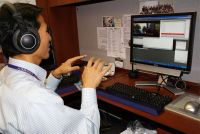MONTEREY, Calif. — With the Defense Department’s emphasis on developing language and cultural skills within the force, it’s working hard to ensure those capabilities don’t get lost after students leave the schoolhouse here.
The Defense Language Institute Foreign Language Center trains thousands of students every year in more than two dozen languages, some that require more than a year of intensive, full-time study. To preserve those skills, the school is boosting its continuing education offerings, both through classroom and distance learning.
“Language skills are perishable,” said Mike Vezilich, dean of the continuing education directorate. “If one doesn’t use the language regularly, those skills atrophy. And that doesn’t take long,” particularly for students at lower proficiency levels.
“It’s not like riding a bike that once you learn it, you know it for life,” Vezilich said. “It’s something you have to continually work at just to maintain certain levels, and then spend lots and lots of time if you want to become really proficient and gain higher skills.”
Operational requirements often make that ongoing education challenging, whether at “survival” language levels or for professional linguists, Vezilich noted.
In some cases, DLI basic course graduates may have a two- or three-year delay before they’re assigned in billets that require their language skills, he said. And regardless of their assignment, it’s often difficult for their units to release them from their duties for refresher or language training.
So while 100 to 120 students attend resident continuing education courses at DLI at any given time, far more are getting additional training through distance learning, mobile training teams and other innovative methods.
“We have had to come up with a different structure in the way we do training, and providing it in the windows [of time] that linguists have,” Vezilich said.
For example, DLI now has 26 language training detachments, all staffed by permanent instructor teams at locations worldwide, he said.
The program started in 2003 with four detachments providing sustainment and enhancement training for professional linguists. It proved so successful that more detachments were formed to offer language and cultural awareness training to more service members.
Meanwhile, DLI’s mobile training teams dispatch wherever they’re needed around the world to provide both post-basic language training and pre-deployment language familiarization.
DLI’s dozen and a half mobile teams typically offer two- to six-week courses in Arabic, Chinese, Dari, Persian Farsi, French, German, Hebrew, Hindi, Italian, Korean, Kurdish, Pashto, Russian, Serbian/Croatian, Spanish, Tagalog, Urdu and Vietnamese.
While increasing the availability and convenience of traditional language education, DLI is using technology to reach as many students wherever they are, and whenever they have the opportunity to study.
Distance learning programs use video tele-training, instructor mobile training teams and a new broadband language training system to deliver instruction in 19 languages.
Last year, the program provided more than 21,000 hours of instruction to nearly 1,300 students, Vezilich reported.
DLI hopes to increase those numbers, in part by using broadband Internet technologies to provide real-time, non-resident language training.
The virtual classroom system is far less expensive than mobile training teams. However, Vezilich said, it replicates much of the personal learning experience through interactive features such as video conferences, chat rooms, instant messaging and online student-teacher consultations.
The program is catching on, enabling students even in the most remote regions to refresh or enhance their language capabilities. In fiscal 2009, it provided 2,400 hours of instruction, but Vezilich predicted big growth as more people learn about it.
“We had matched that number of hours by the third quarter of [fiscal 2010],” he said. “It’s definitely on the rise.”
Steve Collins, an assistant provost who oversees DLI’s continuing education programs, said these and other initiatives advance language and cultural education throughout the force.
“DLI has recognized that it is not just the place for military language professionals and linguists,” Collins said. “It is also a support organization for anyone in DOD that needs foreign language education training and cultural capability.”
And unlike the old days, when Collins said he “felt like a used car salesman in a plaid sports jacket” trying to promote DLI’s language programs, he now finds they’re an easy sell.
“Our great advocates are those people that are coming back from deployments,” he said. “They see the advantage and the importance of this, and what it contributes to the mission.”
Source:
U.S. Department of Defense
Office of the Assistant Secretary of Defense (Public Affairs)

 von
von 